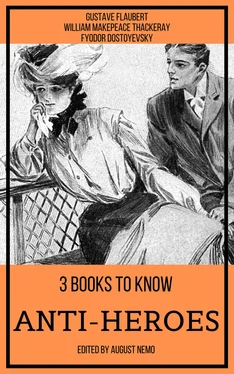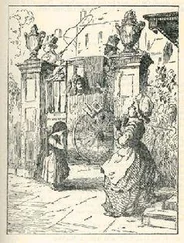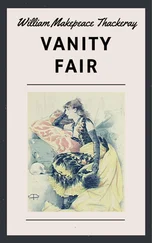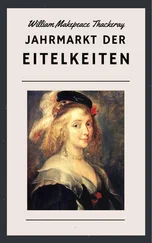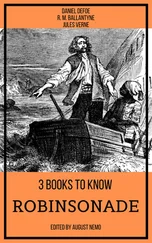The very first day I returned to Castle Brady my trials may be said, in a manner, to have begun. My cousin, Master Mick, a huge monster of nineteen (who hated me, and I promise you I returned the compliment), insulted me at dinner about my mother’s poverty, and made all the girls of the family titter. So when we went to the stables, whither Mick always went for his pipe of tobacco after dinner, I told him a piece of my mind, and there was a fight for at least ten minutes, during which I stood to him like a man, and blacked his left eye, though I was myself only twelve years old at the time. Of course he beat me, but a beating makes only a small impression on a lad of that tender age, as I had proved many times in battles with the ragged Brady’s Town boys before, not one of whom, at my time of life, was my match. My uncle was very much pleased when he heard of my gallantry; my cousin Nora brought brown paper and vinegar for my nose, and I went home that night with a pint of claret under my girdle, not a little proud, let me tell you, at having held my own against Mick so long.
And though he persisted in his bad treatment of me, and used to cane me whenever I fell in his way, yet I was very happy now at Castle Brady with the company there, and my cousins, or some of them, and the kindness of my uncle, with whom I became a prodigious favourite. He bought a colt for me, and taught me to ride. He took me out coursing and fowling, and instructed me to shoot flying. And at length I was released from Mick’s persecution, for his brother, Master Ulick, returning from Trinity College, and hating his elder brother, as is mostly the way in families of fashion, took me under his protection; and from that time, as Ulick was a deal bigger and stronger than Mick, I, English Redmond, as I was called, was left alone; except when the former thought fit to thrash me, which he did whenever he thought proper.
Nor was my learning neglected in the ornamental parts, for I had an uncommon natural genius for many things, and soon topped in accomplishments most of the persons around me. I had a quick ear and a fine voice, which my mother cultivated to the best of her power, and she taught me to step a minuet gravely and gracefully, and thus laid the foundation of my future success in life. The common dances I learned (as, perhaps, I ought not to confess) in the servants’ hall, which, you may be sure, was never without a piper, and where I was considered unrivalled both at a hornpipe and a jig.
In the matter of book-learning, I had always an uncommon taste for reading plays and novels, as the best part of a gentleman’s polite education, and never let a pedlar pass the village, if I had a penny, without having a ballad or two from him. As for your dull grammar, and Greek and Latin and stuff, I have always hated them from my youth upwards, and said, very unmistakably, I would have none of them.
This I proved pretty clearly at the age of thirteen, when my aunt Biddy Brady’s legacy of L100 came in to mamma, who thought to employ the sum on my education, and sent me to Doctor Tobias Tickler’s famous academy at Ballywhacket—Backwhacket, as my uncle used to call it. But six weeks after I had been consigned to his reverence, I suddenly made my appearance again at Castle Brady, having walked forty miles from the odious place, and left the Doctor in a state near upon apoplexy. The fact was, that at taw, prison-bars, or boxing, I was at the head of the school, but could not be brought to excel in the classics; and after having been flogged seven times, without its doing me the least good in my Latin, I refused to submit altogether (finding it useless) to an eighth application of the rod. ‘Try some other way, sir,’ said I, when he was for horsing me once more; but he wouldn’t; whereon, and to defend myself, I flung a slate at him, and knocked down a Scotch usher with a leaden inkstand. All the lads huzza’d at this, and some or the servants wanted to stop me; but taking out a large clasp-knife that my cousin Nora had given me, I swore I would plunge it into the waistcoat of the first man who dared to balk me, and faith they let me pass on. I slept that night twenty miles off Ballywhacket, at the house of a cottier, who gave me potatoes and milk, and to whom I gave a hundred guineas after, when I came to visit Ireland in my days of greatness. I wish I had the money now. But what’s the use of regret? I have had many a harder bed than that I shall sleep on to-night, and many a scantier meal than honest Phil Murphy gave me on the evening I ran away from school. So six weeks’ was all the schooling I ever got. And I say this to let parents know the value of it; for though I have met more learned book-worms in the world, especially a great hulking, clumsy, blear-eyed old doctor, whom they called Johnson, and who lived in a court off Fleet Street, in London, yet I pretty soon silenced him in an argument (at ‘Button’s Coffeehouse’); and in that, and in poetry, and what I call natural philosophy, or the science of life, and in riding, music, leaping, the small-sword, the knowledge of a horse, or a main of cocks, and the manners of an accomplished gentleman and a man of fashion, I may say for myself that Redmond Barry has seldom found his equal. ‘Sir,’ said I to Mr. Johnson, on the occasion I allude to—he was accompanied by a Mr. Buswell of Scotland, and I was presented to the club by a Mr. Goldsmith, a countryman of my own—‘Sir,’ said I, in reply to the schoolmaster’s great thundering quotation in Greek, ‘you fancy you know a great deal more than me, because you quote your Aristotle and your Pluto; but can you tell me which horse will win at Epsom Downs next week?—Can you run six miles without breathing?—Can you shoot the ace of spades ten times without missing? If so, talk about Aristotle and Pluto to me.’
‘D’ye knaw who ye’re speaking to?’ roared out the Scotch gentleman, Mr. Boswell, at this.
‘Hold your tongue, Mr. Boswell,’ said the old schoolmaster. ‘I had no right to brag of my Greek to the gentleman, and he has answered me very well.’
‘Doctor,’ says I, looking waggishly at him, ‘do you know ever a rhyme for ArisTOTLE?’
‘Port, if you plaise,’ says Mr. Goldsmith, laughing. And we had SIX RHYMES FOR ARISTOTLE before we left the coffee-house that evening. It became a regular joke afterwards when I told the story, and at ‘White’s’ or the ‘Cocoa-tree’ you would hear the wags say, ‘Waiter, bring me one of Captain Barry’s rhymes for Aristotle.’ Once, when I was in liquor at the latter place, young Dick Sheridan called me a great Staggerite, a joke which I could never understand. But I am wandering from my story, and must get back to home, and dear old Ireland again.
I have made acquaintance with the best in the land since, and my manners are such, I have said, as to make me the equal of them all; and, perhaps, you will wonder how a country boy, as I was, educated amongst Irish squires, and their dependants of the stable and farm, should arrive at possessing such elegant manners as I was indisputably allowed to have. I had, the fact is, a very valuable instructor in the person of an old gamekeeper, who had served the French king at Fontenoy, and who taught me the dances and customs, and a smattering of the language of that country, with the use of the sword, both small and broad. Many and many a long mile I have trudged by his side as a lad, he telling me wonderful stories of the French king, and the Irish brigade, and Marshal Saxe, and the opera-dancers; he knew my uncle, too, the Chevalier Borgne, and indeed had a thousand accomplishments which he taught me in secret. I never knew a man like him for making or throwing a fly, for physicking a horse, or breaking, or choosing one; he taught me manly sports, from birds’-nesting upwards, and I always shall consider Phil Purcell as the very best tutor I could have had. His fault was drink, but for that I have always had a blind eye; and he hated my cousin Mick like poison; but I could excuse him that too.
Читать дальше
